
 |
|
|
|
Searching for the essence of the American identity, cultural anthropologists Robert and Helen Lynd conducted a famous study in the late 1920s on a place they called "Middletown", which was actually Muncie, Indiana. They looked at the community from various angles -- work, play, the church, etc. Fifty years later, acclaimed docu filmmaker Peter Davis (The Selling of the Pentagon, Hearts and Minds), returned to Muncie to make a docu miniseries for PBS. Davis found that the residents had retained similar attitudes and worried about similar problems. The six-part Middletown ran nationwide in 1982 -- but minus the sixth installment, which PBS refused to show due to its controversial nature. Now, almost thirty years further down the line, this rare miniseries has been released uncut on DVD by Icarus Films. 1 Producer Davis brought several picked documentary specialists to Muncie and directed one of the shows himself. We're told that the film crews worked in and around Muncie for almost two years. Muncie in 1982 seems a fairly rural town with conventional attitudes. Its local culture has not yet been bulldozed by national media, cable TV and the new electronic realities. The most sophisticated communication device is still the telephone, and the enthusiasm for local sports hasn't been diluted by easy access to sports on TV. Only a couple of times do the directors sit their subjects down in a formal interview session. The shows employ handheld docu cameras, following their subjects as they work, play and discuss their problems. It's not that the subjects aren't aware of the camera, but that the film crews became such a fixture in their daily routines that the people could to some extent ignore them. 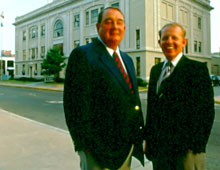
The Campaign (director: Tom Cohen) is a smart show that follows a mayoral race in Muncie. The better known Democrat is Jim Carey, a large, garrulous man who shakes hands, kisses babies and runs to wherever he thinks he might find votes; we're given to understand that a few votes one way or the other could well make a difference in this election. A somewhat vulgar guy, Carey is a known quantity trusted by many despite an open-secret problem in his past involving accusations of corruption. His opponent is Alan Wilson, a young lawyer who appears to have been talked into running by the Republican Party. Not the outgoing type, Wilson can be seen quietly walking door to door, while Carey attends church services, labor meetings, and dashes out to a local slum to hear complaints about a smelly garbage dump. Frustrated by mixed signals from his advisors, Wilson goes through the motions of campaigning just to get it over with. On Election Day Carey is still trawling for every conceivable vote. The outcome is something of a civilized surprise. 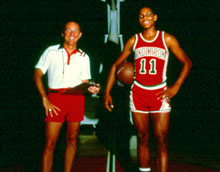
The Big Game (director: E.J. Vaughn) digs deeper into the fabric of the community to examine players and coaches on two local competitive teams. Basketball is a very big deal in Muncie. The coaches make expert use of discipline and psychology to hone the performance of kids that need serious motivation. One kid is a lanky, self-confident but reasonable guy from a fairly upscale background; he stays out of the way when his coach makes good on some disciplinary threats and scratches a couple of players from the team. We see how the parents "get involved" when the father of one of the cut players makes a big morality pitch as to why his son's future has "been destroyed" by an arbitrary call. The kid sits there and plays the innocent martyr. This is serious business -- these people have decided that sports are the ticket to college, even though many of the players simply aren't college material. On the other team is a talented black player who doesn't apply himself as consistently as his coach would like. The coach gives the kid the works, motivationally speaking, but he maintains his attitude of, "I still have time to get my act together". The show concludes with good coverage of the big game, where all of these dreams, ambitions and illusions clash in an hour's play on the basketball court. 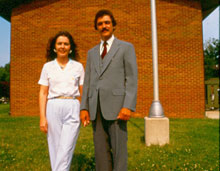
The Second Time Around (director: Peter Davis) builds a strong emotional charge. Both David and Elaine have been divorced and she has two boys; the attractive couple is crazy about each other and has a lot of potential. The show covers the last few weeks before their planned wedding, as they face issues and work out problems that might put their plans in doubt. Neither is a starry-eyed innocent, and their discussions have an edge of hard reality. They look at houses, but the cute $60,000 listings they find are just not in their budget: the best loan they can get carries a 15% interest rate. (!!!) The houses in their realistic price range are in run-down neighborhoods and look terrible. David refuses to rent and wants Elaine to work as well so they can build equity and get a handle on debt. He also would like Elaine to have another child, and fulfill a traditional housewife role as well. Elaine doesn't want to both work and have a baby, but might consider that if David takes equal responsibility for raising the children. And so the negotiations proceed, always honest and tender, but with the realization that either party could back out. On top of all this, David's mother snipes at Elaine's idea of a black wedding dress and uses sentiment for her deceased husband to impose her will on other wedding plans. We invest in this couple's situation early on, and really want them to have a "happy ending". 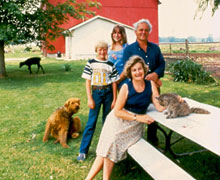
Community of Praise (directors: Richard Leacock & Marisa Silver) is an educational eye opener, especially for viewers with little close-up experience with religious fundamentalists. We see the farming Tobey household as it deals with everyday problems. The mother has worked Jesus into every moment of her family's waking life; it's the reason for everything she does and both the carrot and the stick for her child-rearing style, which is both loving and inflexible. The father defends his policy of using corporal punishment when disobeyed. He talks about marrying for stability, which their evangelical church provides in spades -- with prayer meetings, Bible study meetings and youth gatherings that hammer home the message of 100% obedience to parents. The kids must be "willing" to accept the presence of Jesus in their lives at all times. The Church leader / local veterinarian teaches the kids that demons are responsible for everything not aligned with Jesus. In one group meeting, members fall to the floor shaking; in another they retch to spit up the demons hiding in their bodies. The youngest boy has a rebellious nature and balks at being used for farm labor whenevere he's not eating, attending school or studying. A daughter wears a cage-like back brace for Scoliosis, and believes that her healing is due to Jesus' intervention. Both kids are as sweet as can be, even the little fellow "unwilling to be willing". By any sane standard the mother comes off as a manic obsessive, perhaps even a psychotic. Bless 'em all, but this is just psychological tyranny. 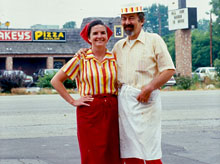
Family Business (director: Tom Cohen) is another emotional episode. The Sniders run a Shakey's Pizza Parlor hampered by a disadvantageous location. Ex-Marine Howie Snider runs the shop, makes merry with the guests and performs on his banjo every night but still can't break even. His grown sons and daughters work at the parlor and offer valiant support, even though some are convinced that the business is a lost cause. But it's Howie that must grovel on the phone to the Shakey's home office for an extension on his overdue franchise royalty bill -- while his hardworking wife sits next to him and cries. Meanwhile, one of his sons considers going into the military. Packed into a car, the boys express love and fear for their dad, and how much they admire him -- while wanting him to stop suffering. Howie puts up a noble front but calls a family meeting to spell out the situation -- where do they go from here? Our heart goes out to these honest, deserving people. One daughter's loving dinner table testimony to her commitment to her father will induce tears. 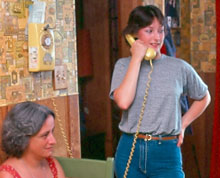
According to producer Davis (in his interview included in the disc set), PBS network executives killed the broadcast of the final episode Seventeen (directors: Joel Scott & Jeff Krines). The almost two-hour show follows a group of lower income white and black kids in a Muncie high school, and has the guts to show them as they really are -- wild. The show begins with an openly scornful teen girl telling her cooking teacher (a pretty hopeless case) to "kiss my a__", setting the bar for the teen respect for authority. What parental supervision exists has no clue as to what's going on. Another attractive dark-haired girl named Lynn is boy-crazy and shows little sense of self-restraint. She drinks, smokes dope, and with her girlfriend dates a pair of black boys that treat them like trash. One black student has gotten another pregnant but regards the entire situation as a joke. As Peter Davis says, the kids are striving to seize their independence without assuming adult responsibilities. A girl at a party complains about her false reputation for sleeping around, but is using the conversation topic to flirt with a boy. A guy relates details of his trashy sexual adventures to a friend, not realizing that a girl is standing right behind him. He's embarrassed but the girl acts as if she's heard nothing unusual. Lynn throws a fit at her black boyfriend, complaining that she jeopardizes her entire reputation going out with him while he risks nothing. Lynn couldn't care less until a cross is burned on her front lawn and her mother receives threatening phone calls from some black teens. The adults start talking about carrying guns. Producer Davis is indignant about the way PBS tried to get him to disembowel Seventeen. He believes that the public TV system was defending itself against Reagan-era attempts to shut it down and was worried about the obvious firestorm that would result when Southern affiliates saw scenes of interracial kissing. The kids talk a fairly constant stream of obscenities and racial insults. According to Davis, PBS didn't defend his work and tried to trick him into altering it with a false series of negotiations - and then screened it to conservative factions in Muncie to generate negative publicity against a broadcast. Davis refused to cave in and the film wasn't shown on TV. It instead became a theatrical release in 1983. Then again, I'm not sure TV was ready for Seventeen in 1982. To some degree the 'invasion of privacy' argument may be valid. These reckless teens didn't care if the camera showed them making asses of themselves, committing misdemeanors or doing things that might turn around and bite them, hard, in years to come. They truly need protection from their own bad judgment. In the case of the political candidates there's no conflict, as they both want the coverage. The couple in Second Time Around know they'll be presented in a positive light, and probably hope that the film will make a fantastic record of their wedding. But the kids of Seventeen are obviously not responsible for their own behavior. I'm not sure that 'protecting the subject' is the proper function of documentary filmmakers, though. Their primary mission is to record the truth, and they've done that beautifully. Where else is there such honest reportage of what really goes on in Middle America? 2 The six films add up to a powerful portrait of Muncie in '82. Every so often we notice a "character" from one story appearing in another, as when both of the candidates show up at the big basketball game. Although the view of the town is by necessity selective, we sense the presence of a dynamic community beyond the edges of the screen. We don't assume that all the residents are evangelicals any more than we assume that all the kids lead lives like the ones pictured in Seventeen. Icarus Films' DVD set of Middletown presents the six shows on four discs, along with an added interview with Peter Davis. The image quality is limited by the technology from 1982: the shows appear to be shot mostly on 16mm film and finished on old 2" Quad tape. Color correction and timing are pretty dire, and the fomat's weakness shows in horizontal banding and an occasional tape hit. The shows seem to have been finished on tape, not film, so a film restoration is not possible. The audio recording is good but many situations arise where we must intuit the gist of what's being said rather than hearing the words clearly -- some slurred and overlapped speeches are just too hard to make out against background noise. Assuming that we are meant to hear everything that's being said, closed captions or subtitles would have been a plus. In his interview Davis explains the genesis of the project and talks about hiring his other directors, all of which were accomplished documentarians. The quality of the final product reflects the decent budget allocated to the filmmakers, who shot an enormous amount of film. Peter Davis tells us that almost every episode developed in a different direction from what was actually planned -- the filmmakers "followed" life instead of trying to make it fit into a preconceived outline. Davis also contributes an absorbing 16-page essay in an insert booklet, explaining in more detail the relationship between his show and the famous researchers from the 1920s. For each segment he adds a "where are they now?" postscript for the "stars" of the shows. Some of the news is good, and some isn't. Davis reports that the participants in Seventeen mostly declined to respond to inquiries ... a result of negative fallout from PBS' inflammatory local screening.
On a scale of Excellent, Good, Fair, and Poor,
Middletown rates:
Footnotes:
1. I wonder if the original Lynd studies inspired Robert Riskind's Magic Town, a somewhat muffed attempt to re-create the magic of a Frank Capra film. In it pollster James Stewart locates a perfect "middletown" possessed of just the right social and economic makeup to enable a small poll taken there to accurately reflect the opinion of the whole country. It's a gold mine for Stewart's business until the town learns that it's "special", whereupon all the qualities that make it "perfectly average" disappear in a storm of civic puffery and overdevelopment. The movie flopped. I doubt that Americans paid any attention to polls until they found out that the Nielsen Company was deciding which TV shows were popular and which should be dropped.
2. I was my high school's "movie guy" circa 1969-1970. In my senior year I was a trusted teacher's pet allowed to cut classes now and then to film things for campus assemblies. When they put up a security fence we did a takeoff on The Great Escape. I filmed a school club's yearly picnic where they re-whitewashed the Pacific High "P" on a hillside behind campus. The ritual involved girlfriends cutting school to make out with the club members, The Doors on the 8-track car stereos, lots of beer, the works - during school hours. When the club faculty advisor heard about the film he demanded to see it and refused to let me show it on campus. All I had to do was run right to the local newspaper with my story and I probably could have started a career as a
A campaign film I did for a friend was shown near the end of school. When it screened a big "oh" went up in the auditorium, as right in the middle of a scene in the cafeteria appeared a popular girl who had died tragically in an auto accident a few weeks before. I didn't know her, so I hadn't caught the significance of the shot. I again showed my inexperience -- the mother of the candidate asked to borrow the film, and then refused to return it. She and her son behaved as if I had "done something wrong". So I naturally side with any rogue filmmaker who shows people truthful things they don't want to see. I also admire docu filmmakers' formidable, inexhaustible patience.
Reviews on the Savant main site have additional credits information and are often updated and annotated with reader input and graphics. Also, don't forget the 2010 Savant Wish List. T'was Ever Thus.
Review Staff | About DVD Talk | Newsletter Subscribe | Join DVD Talk Forum |
| ||||||||||||||||||